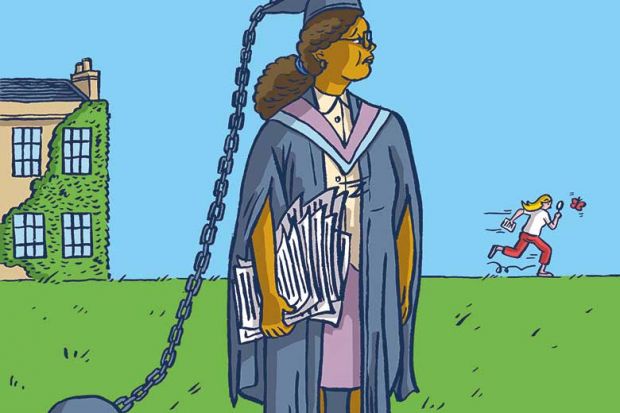In 1999, the veteran Labour Party politician Tony Benn retired as a Member of Parliament, stating that he wanted “more time to devote to politics and more freedom to do so”. I have heard much the same tongue-only-partly-in-cheek sentiment expressed by any number of newly retired academics. They finally have the opportunity, they tell me, to be real academics.
Yes, they miss their close colleagues, and those not yet eligible to receive their pensions miss the security of a monthly pay packet. But there is an awful lot they do not miss: the marking, the red tape, the targets and performance indicators that have replaced slow scholarship and the senior common room.
Aside from the time-consuming and stressful nature of meeting all the expectations, there is also the way those demands chip away at academic freedom. You must publish only in the top journals in your field. You must focus on research that fits your department’s narrative for the research excellence framework. You must apply for big grants from prestigious funders that reflect the full economic cost of your time. And you must accept your McDonaldised lot on large undergraduate courses by running your seminar using the same materials and “solutions” as all the other parallel franchisees.
By contrast, independent academics are free to determine their own research agenda, timetable and funding needs, and can turn down all teaching that is not genuinely within their area of expertise.
Still, a sense lingers that you can’t really call yourself an academic if you don’t work in a university. But that is a very 20th-century view. Scholarship as a lifestyle choice has been around a lot longer than universities have as institutions. Many of the great contributions to scholarship have had little or nothing to do with universities.
In the 19th century, Gregor Mendel, an Augustinian monk from Moravia, spent eight years testing tens of thousands of pea plants, work that led to the discovery of the basic laws of inheritance. During the same period, scientific advances in the UK were driven by the likes of the Royal Society, the Royal Institution, the Ashmolean Museum and the Society of Antiquaries of London. Universities’ research ambitions are the product of a comparatively recent reinvention of what were historically teaching institutions.
Meanwhile, advances in technology pioneered in universities mean that, in the 21st century, it is far easier than it was to conduct an academic career without being connected in any way with a university. As well as researching independently – particularly if they are not reliant on expensive equipment – many former university staff have also forged successful post-retirement careers as consultants, part-time teachers and public intellectuals. They can communicate and network internationally via specialist social media, online conferences and open-access publications, and still work for universities if they choose, on a visiting or consultancy basis.
There is also a more philosophical sense in which being an academic has little or nothing to do with being employed by a university. In a recently published article, I argue that a scholar needs to possess a number of qualities or dispositions. These include a commitment to reason; scepticism about knowledge claims; humility enough to acknowledge intellectual debts; willingness to work collaboratively to advance understanding for the common good; and commitment to your own beliefs and values while being open to the possibility that your pet version of the truth may be flawed. Such qualities are equally important in researching and teaching, but none of them depends on being employed by a university.
Moreover, is it necessarily the case that everyone working for universities is an academic? The growing unbundling of the academic role into specialised pathways for teaching and research means that there are now far fewer all-round scholars. Universities are filling up with what might be called “para-academics”: teachers who don’t do research, researchers who don’t teach, and managers who do neither.
In the UK, the requirement to submit to the 2021 REF all academics whose contracts state a “significant responsibility” for research will only accelerate this trend, as many all-rounders deemed to bring down the departmental average will be forced on to teaching-only contracts.
The vast majority of us cannot do without our university incomes; “All you have to lose is your salary!” is not exactly an attractive rallying cry, especially if you have a mortgage and a family to feed. However, at a time when many feel beleaguered and depressed by the hollowing-out of the freedoms of academic life, it is important to underline that being an academic is, in essence, a vocation rather than a profession.
Those of us committed to the pursuit of scholarship will always try to continue our life’s work, with or without a university position and income. It is simply who we are. Our academic identity is not in our contracts but in our blood.
Bruce Macfarlane is professor of higher education and head of the School of Education at the University of Bristol. His latest article, “What does it mean to be a S.C.H.O.L.A.R.? Or, why a good teacher is no different from a good researcher”, is published online in Teaching in Higher Education.
POSTSCRIPT:
Print headline: Intellectual liberation
Register to continue
Why register?
- Registration is free and only takes a moment
- Once registered, you can read 3 articles a month
- Sign up for our newsletter
Subscribe
Or subscribe for unlimited access to:
- Unlimited access to news, views, insights & reviews
- Digital editions
- Digital access to THE’s university and college rankings analysis
Already registered or a current subscriber? Login









